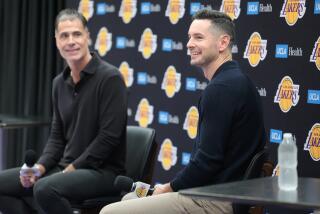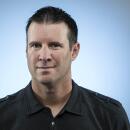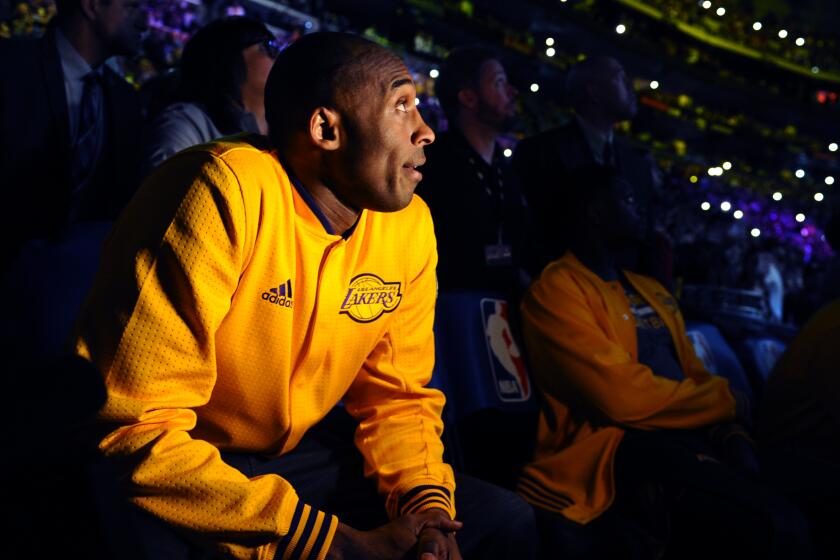Pau Gasol’s trade to Lakers changed the NBA
- Share via
Pau Gasol was shifting uncomfortably in the waiting room outside his boss’ office, forced to wait half an hour for reasons unknown.
He was told to go directly from the practice court to the front office, where he had never been summoned. He wasn’t even allowed to shower.
So he sat. And squirmed. And wondered what was happening.
Then Chris Wallace opened the door, invited Gasol into his office and said five words that changed the NBA landscape: “We just made a trade.”
Gasol would be leaving the Memphis Grizzlies and joining the Lakers, adding a face to the franchise alongside a beleaguered Kobe Bryant.
He left behind a team that had six coaches in his 6 1/2 seasons and went to a team with one of the game’s best players and coaches . . . but also a 28-16 record that wasn’t throwing a scare into anybody.
In fact, the only people who had been spooked were the Lakers themselves, eight months earlier, when Bryant publicly demanded to be traded, tired of failing to get past the first round of the playoffs.
Then came Gasol, exactly two years ago Monday, and the Lakers stopped turning into a one-and-done postseason punch line.
They are 130-37 in the regular season since his acquisition and 30-14 in the playoffs with two NBA Finals appearances -- one successful, one not.
Gasol, 29, is happy. Bryant is happy. Twenty-nine other teams presumably aren’t thrilled, but that’s not the type of thing that keeps the Lakers up at night.
Bryant remembers how he reacted when he first heard about the deal.
“Yesssss,” he said, pumping his fist. “His versatility, his passing, everything that he has fits perfectly with what we have going on here. Once I knew about it, I was just hoping it was going to go through. It did, and I was pretty excited, to say the least.”
It almost didn’t go through.
The Lakers had just lost Andrew Bynum to a knee injury and sensed the need to maintain the modicum of momentum they established at the midpoint of the season.
They had a valuable piece -- Kwame Brown’s expiring contract of $9.1 million -- and found a team in the cash-strapped Grizzlies that wanted to part with the three years and $49.4 million left on Gasol’s deal.
But the Lakers didn’t want to deal any more players beyond erratic rookie Javaris Crittenton and second-round pick Marc Gasol, who was not under contract with them. The NBA has fairly rigid guidelines when teams make trades, and the Lakers weren’t offering enough player salaries to adhere to rules aimed at limiting salary dumping.
So General Manager Mitch Kupchak thought of making a pitch to former Lakers guard Aaron McKie, a part-time assistant coach with Philadelphia at the time. The Lakers offered to pay him $750,000, sign him for one day and then trade him to Memphis.
McKie, however, was happy with the 76ers, and didn’t want to leave. It got a little dicey.
“There was one stumbling block -- the numbers didn’t work and you had to get Aaron McKie on board,” Kupchak said. “It didn’t look like we were going to be able to do that. We ended up working late into the night. My feeling was if we didn’t get it done that night, it would probably hit the papers because the rumors would get out. When things hit the wire and it’s now a public issue, it’s kind of like all bets are off. I felt like if it’s not going to happen that night, then it’s going to fall apart.”
McKie eventually relented and the Lakers were elated, also sending two first-round picks to the Grizzlies in exchange for Gasol and a second-rounder in 2010.
It was met with predictable angst across the league, most publicly in San Antonio, where Spurs Coach Gregg Popovich opined that a trade committee needed to be established to prevent such deals.
The Lakers, however, didn’t automatically think they had acquired a game-changer.
Fans had soured on Gasol in Memphis, booing him at home games after it became public a year earlier that he wanted to be traded. He came with the reputation of a gifted, but not tough, athlete. There was a degree of anxiety.
“It’s kind of like buying a house,” Kupchak said. “When you buy a house that you’ve had your eye on for months and they accept your offer and the bank presents you with documents and paperwork and you’re laying in bed at night and you’re paying a little more for the house, you’ve got buyer’s remorse. It’s kind of the same for general managers.
“You get a deal done and you think you’ve done something helpful, but you have to see how it works out. We thought he was going to help us with his skill set for the triangle, but you never know. Within a couple of weeks, we felt pretty confident pretty quickly.”
Gasol was pretty pumped pretty quickly.
He was initially confused when Wallace, the Grizzlies’ general manager, called him into the office after practice that day. He figured it was related to the back pain he had been feeling or an outside opinion in the works with a back specialist.
When the door finally opened, and Wallace uttered something about being traded, Gasol thought Wallace was talking about the fact that Stromile Swift, a Grizzlies forward-center at the time, had been traded earlier that day.
“I told him, ‘Stromile told me this morning,’ ” Gasol said. “But Chris said, ‘No. We’ve traded you to the Los Angeles Lakers.’ ”
Gasol was stunned.
He thought he was going to get dealt to the Chicago Bulls the previous season and was disappointed when it didn’t work out. But this was the real thing.
“I couldn’t believe it because my hopes were totally, totally gone after the struggles of the year before,” he said “I didn’t hear any rumors about the Lakers wanting me when it happened. I was shocked. Absolutely shocked.”
So was former Grizzlies coach Mike Fratello, who had been fired by the Grizzlies the previous season but remains a Gasol advocate to this day as a TNT analyst.
“I’m answering [the question] without having to write paychecks and balance budgets, but I would have never traded Pau, in my thinking,” Fratello said. “I would have tried to build a championship team in Memphis around Pau and add to those pieces. I thought that much of him.
“To me when you get that piece, that anchor, Pau, he’s young, he’s not a 34-year-old, 35-year-old on the downside of his career. But that’s not taking into consideration the owner, who has to take a look at the market and money that he might be losing.”
The Grizzlies went to the playoffs three consecutive seasons with Gasol but were swept all three times. They were languishing at 13-33 that season and looking to shed salary while eventually rebuilding around rising second-year player Rudy Gay.
“Brown was the largest expiring contact we could find in the league where we also got back an attractive young player like Crittenton . . . and multiple first-round picks,” Wallace said at the time.
Crittenton was never a factor for Memphis, was traded the following season and was recently suspended the rest of this season for bringing a gun into the locker room after an alleged dispute with Washington teammate Gilbert Arenas.
But the Grizzlies may have found a solid player in Gasol’s brother. Marc Gasol, 25, was averaging 15.1 points and 9.6 rebounds coming into Saturday’s game as a burly, back-to-the-basket center.
He was a pudgy player when the Lakers selected him in the second round of the 2007 draft and was just beginning to play well overseas when they dealt him to Memphis.
“I wouldn’t be surprised if he makes the All-Star team one day, but, yes, in high school he was overweight,” Kupchak said. “Only in January [2008] did we start to get glowing reports from our scouts overseas that we may have something here because he was growing into his body.”
Does Kupchak regret giving up the younger Gasol? Not for a second.
“Memphis, looking back at it now, made a pretty good deal,” Kupchak said. “At the time, they took a beating. They ended up getting a player that we both knew was a good player and he’s going to get a lot better. They got a lot of flexibility. They got multiple draft picks. I’m happy for Memphis because that’s how it should be.”
In the end, the Lakers have the Gasol who is the three-time All-Star. He was definitely ready to leave Memphis.
“It got to the point that I lost a little bit of my motivation and felt like I was just getting older really fast,” he said. “We improved, but it was never quite enough. You have good seasons, good solid seasons and then you get your butt kicked, plain and simple.”
He knew almost nothing of Los Angeles when the trade took place, other than the Sunset Strip, Rodeo Drive and the Beverly Wilshire Hotel, where the Grizzlies stayed when playing in L.A.
He has settled into a relaxed Southern California lifestyle, often playing beach volleyball near his Redondo Beach home during the off-season. And he just signed a three-year extension.
“I’m so appreciative and thankful since I got here,” he said. “I want to do everything in my power to be able to contribute as much as possible. I understand how lucky and fortunate I am to be here.”
twitter.com/Mike_Bresnahan
More to Read
All things Lakers, all the time.
Get all the Lakers news you need in Dan Woike's weekly newsletter.
You may occasionally receive promotional content from the Los Angeles Times.









